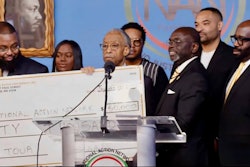The relationship between Historically Black Colleges and Universities (HBCUs) and their city leadership starts with a simple handshake but results in economic growth, research connecting with policy, and increased opportunities for Black and Brown individuals to give back to their community as they accelerate into the middle class and beyond.
 Frank Scott, Jr., mayor of Little Rock, Arkansas.
Frank Scott, Jr., mayor of Little Rock, Arkansas.
The Mayor of Little Rock, Arkansas, Frank Scott, Jr., is also the president of the AAMA, which represents over 500 mayors across the country and cities which make over one third of the U.S.’s GDP.
During the webinar, Scott spoke about his connections with the three HBCUs located in his city, Arkansas Baptist College, Philander Smith College, and Shorter College, calling them “hubs, think tanks to test pilot programming for policies.”
“We are focused on pillars with Black technology, building the middle class, understanding what we can do to cut officer-involved shootings in half, and setting carbon-neutral metrics for cities. HBCUs play a vital role in those pillars,” said Scott. “Sitting county executive leaders have to understand that HBCUs are churning out qualified students, but also, HBCUs are economic generators for our cities.”
HBCUs provide employment and produce sales tax revenue for their cities. According to Scott, 81% of HBCUs are located in counties in the U.S. with below-average earnings, which is why he said city councils and HBCUs need to “connect the dots” between HBCU graduates and the local economy, creating a system of equitable economic empowerment from which both benefit.
Many major cities are dealing with workforce shortages in healthcare, and Little Rock is no exception, said Scott.















